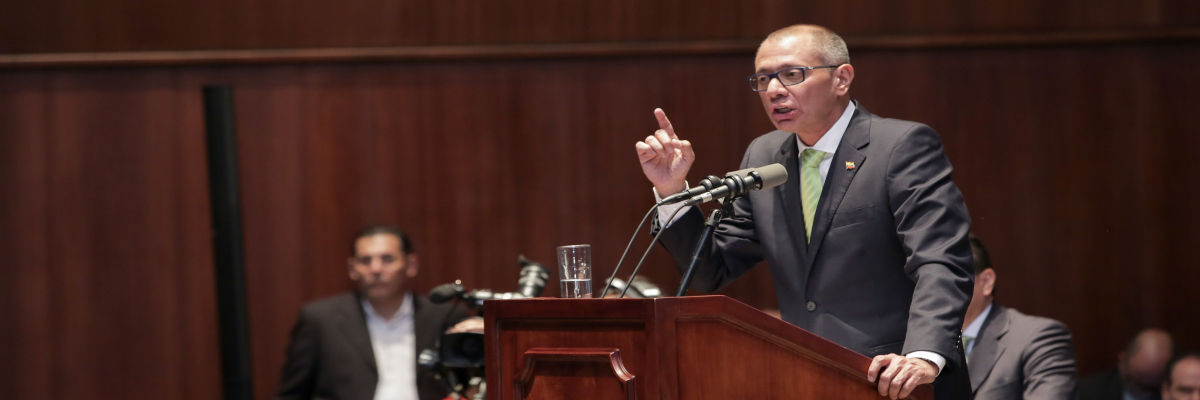Diplomacy
Biden Administration Should Demand Ecuador Immediately Release Political Opponent Illegally Kidnapped From Mexico’s Embassy

Image Source : Wikimedia Commons
Subscribe to our weekly newsletters for free
If you want to subscribe to World & New World Newsletter, please enter
your e-mail
Diplomacy

Image Source : Wikimedia Commons
First Published in: Apr.08,2024
May.03, 2024
Washington, DC — The Biden administration should immediately demand that Ecuador release former vice president Jorge Glas from custody, and allow him to return to the political asylum that the Mexican government had granted him, said Mark Weisbrot, Co-Director of the Center for Economic and Policy Research. Glas had sought political asylum in the Mexican embassy, claiming that he is a victim of persecution and lawfare by Attorney General Diana Salazar and the Daniel Noboa government. The Mexican government granted his request for political asylum on Friday; Ecuadorian authorities raided the embassy on Friday night, reportedly injuring several Mexican nationals and knocking the Mexican mission’s second-in-command — a career diplomat — to the ground in a dramatic incident caught on video. “Ecuador’s government has committed a very serious crime, one that threatens the security of embassies and diplomats throughout the world — not least those of the United States, which has threats to its embassies in much of the world,” Weisbrot said. “The international community cannot allow this to happen. The United States, as a permanent member of the UN Security Council, should propose a resolution there as well, to force the release of the kidnapped prisoner.” The Ecuadorian government’s actions violate the Vienna Convention on Diplomatic Relations and pose a direct threat to the principles of asylum, of national sovereignty, and of diplomatic immunity. This clear violation of international law is the latest in a series of troubling actions by the Noboa government, which include his declaration of an “internal armed conflict,” the deployment of military forces for domestic law enforcement, mass arrests, and rampant human rights violations. The Noboa administration’s raid on the embassy has been met with condemnation from many governments in the region, including Argentina, Bolivia, Brazil, Chile, Colombia, Cuba, Guatemala, Honduras (the current head of the Community of Latin American and Caribbean States, CELAC), Nicaragua, Panama, Paraguay, Peru, Uruguay, Venezuela, and Antigua and Barbuda. Colombian president Gustavo Petro says his government is seeking human rights protections for Glas. Canada criticized the Ecuadorian government’s actions. Both the Organization of American States and CELAC have issued statements rejecting the Noboa government’s actions, and have said they will each hold special meetings to address the matter. Josep Borrell, the High Representative of the European Union for Foreign Affairs and Security Policy, condemned the embassy raid, and the UN secretary-general issued a statement “stress[ing] that violations of this principle jeopardize the pursuit of normal international relations.” Weisbrot noted that such crimes as Ecuador committed on Friday are quite rare, and are taken very seriously, because of the threat that they pose to the system of international diplomacy. This is the system that nations rely upon to try and resolve conflicts without violence and war. The International Court of Justice has held that “there was no more fundamental prerequisite for relations between States than the inviolability of diplomatic envoys and embassies …” Several members of the US Congress have also condemned the Noboa government’s actions. The Biden administration’s statement, made yesterday evening, “condemns any violation of the Vienna Convention on Diplomatic Relations.” The administration has recently deepened military and security relations with the Noboa government in the midst of Noboa’s broad crackdown and rights violations. The Ecuadorian government’s actions are a grave violation of international law and norms, and pose a dangerous precedent. Embassies are considered foreign territory, and Ecuador’s raid is a violation of Mexico’s territorial sovereignty under the law. Host governments historically have avoided violating embassies even when desiring to apprehend individuals seeking refuge or asylum. The British government did not raid Ecuador’s embassy in London in the years that Julian Assange was staying there; it was only after the Ecuadorian government of Lenín Moreno revoked Assange’s Ecuadorian citizenship and evicted him from the embassy that British authorities took him into custody. Likewise, the Pinochet dictatorship and other Latin American dictatorships never violated the integrity of foreign embassies, even to apprehend wanted dissidents or political opponents. The coup government of Jeanine Áñez in Bolivia never raided the Mexican embassy where several officials from the illegally ousted Evo Morales government had sought refuge following the 2019 coup d’etat. Salazar has long engaged in a campaign of lawfare and political persecution against former president Rafael Correa and other figures from the former Correa government. The charges against Correa have been shown to have so little credibility, and the evidence is so lacking, that Interpol for years has refused to act on Ecuador’s red notice against him. Belgium has granted him political asylum, and he can travel freely to almost anywhere in the world without fear of extradition. And last year, a Brazilian supreme court judge annulled evidence against Glas after authorities admitted it may have been tampered with. “The United States is providing crucial diplomatic, military, and material support to Ecuador; and Canada is currently seeking a ‘free trade’ agreement with Ecuador,” said Weisbrot. “All of this should be suspended until Ecuador releases its former vice president, who it has kidnapped from Mexico’s embassy.”
First published in :

CEPR was co-founded by economists Dean Baker and Mark Weisbrot. The Center for Economic and Policy Research (CEPR) was established in 1999 to promote democratic debate on the most important economic and social issues that affect people’s lives. In order for citizens to effectively exercise their voices in a democracy, they should be informed about the problems and choices that they face. CEPR is committed to presenting issues in an accurate and understandable manner, so that the public is better prepared to choose among the various policy options.
Unlock articles by signing up or logging in.
Become a member for unrestricted reading!